The role of a certified clinical exercise physiologist often includes working in cardiac rehab, hospitals, and medically supervised fitness programs. Your Fitness Home has compiled the latest information that help you in becoming a certified clinical exercise physiologist in 2024-25. See the details below:
- Educational Requirement: EDAQA Bachelor’s in exercise science, physiology, or a related field Certain certifications make you eligible for a master’s degree
- Professional Experience: Diverse Populations (150 hours of experience working with diverse populations for some certifications)
- Certification: Current CPR/AED certification is required. Maintain and level up with an ACSM or CSEP certification.

What is the skill set of a certified clinical physiologist?
A certified clinical exercise physiologist is trained with a specialized skill set that includes exercise testing, patient assessment, and creating safe workout plans for people with chronic diseases or medical conditions.
- Technical and Scientific Knowledge: Relationship to Anatomy, Physiology & Kinesiology. Exercise/Workout science & prescription pros
- Clinical Patient Care: Perform physical examinations, and create personalized plans Effective communication and Interpersonal skills to educate and motivate patients.
- Problem-solving skills: Recognizing limitations in your patients and doing something about it
- Collaboration through effective communication: Ability to work with other healthcare professionals as a team.
- Professionalism: Integrity and Respect for Patients & Their Safety.
According to the U.S. Bureau of Labor Statistics, exercise physiologists typically need at least a bachelor’s degree, and the field shows a steady job outlook with competitive salaries.
Who Is Eligible To Get Exercise Physiology Certification?
Exercise physiology certification is not for everyone. Normally, a bachelor’s degree in exercise science or kinesiology is required. To become a certified clinical exercise physiologist, candidates usually need a bachelor’s or master’s degree in exercise science or a related field, along with hands-on clinical experience and CPR/AED certification.The coursework covers anatomy, physiology, and exercise science principles. Certain certifications even accept a master’s degree as an alternative for related experience. Furthermore, fieldwork with diverse communities is generally required to achieve a certificate although hour requirements differ by certification body.
What Is The Average Clinical Physiologist Salary In The United States?
On average, a certified clinical exercise physiologist in the U.S. earns a median annual salary of around $58,160 as of May 2024, according to the U.S. Bureau of Labor Statistics
Clinical Physiologist Salaries in the U.S. As of the most recent data:
- How much does a Clinical Physiologist get paid annually, the salary per annum ranges approximately between $60,000 and $80,000.
- On average, entry-level LPN positions may earn as much as around $ 50k to 55k per year.
- For the more seasoned Clinical Physiologists, this number jumps to over $90,000 or greater annually. (explore the topic: Personal Trainer Cost)
These numbers may of course vary based on the factors above, as well as trends in healthcare. The information specified in the article is subject to change, it may be best used guided by a local recent salary survey or job post and obviously as an indicator rather than a definitive answer.
Top Ways a Certified Clinical Exercise Physiologist Can Increase Income
A certified clinical exercise physiologist is trained to assess, plan, and supervise exercise programs for individuals with chronic health conditions.There are multiple ways an exercise physiologist can earn more money For advanced knowledge in areas such as cardiac rehab or geriatrics, there is less competition and an ability to make more money. You can attract potential clients from word of mouth and your reputation on top of marketing by good patient experiences. Being private and outpatient has more flexibility on how much FFS is charged. You can add extra services like nutrition coaching or online training programs that ensure multiple income streams.
What Is The Scope Of Exercise Science Certifications?
To qualify as a certified clinical exercise physiologist, candidates must complete both academic education and supervised clinical experience. Certifications: Exercise science certifications demonstrate that you have the knowledge and expertise required to develop safe, effective exercise programs. It depends on the certification itself. A few are more generalized to the fitness population whilst others cater to specific populations i.e. Older Adults or Athletes. Earning exercise science certifications can open up a wide range of career opportunities for a certified clinical exercise physiologist, including roles in hospitals, cardiac rehab centers, research labs, and fitness clinics.
Certifications: Cardiac Rehabilitation and Chronic Program Design, etc…. They are generally not a substitute for state licensing requirements to work as a physical therapist or athletic trainer.
Types Of Exercise Physiology Certification
One of the most recognized credentials in this field is the Certified Clinical Exercise Physiologist (CEP) certification, offered by ACSM, along with other certifications like ACSM-EP, NSCA-CPT, and ACE Clinical Exercise Specialist. While the Certified Clinical Exercise Physiologist designation is a particular credential, the field of exercise physiology offers various options. Credentials like the ACSM Certified Exercise Physiologist concentrate more on general fitness for those with medical approval for exercise. Others cater to specific areas, such as the NSCA Certified Strength and Conditioning Specialist targeting athletic performance enhancement or certifications for example the ACSM Certified Exercise Specialist addressing exercise prescription for older adult populations.
Which Institutes Offer Certified Clinical Exercise Physiologist Certification?
Several reputable organizations provide the CCEP certification. The American College of Sports Medicine or ACSM, with its ACSM-CEP credential widely acknowledged as legitimate, is a prominent institute. Another is the American Society of Exercise Physiologists awarding the Certified Exercise Physiologist credential concentrating on clinical preparation. Both necessitate an undergraduate degree, work experience, and passing their respective qualifying assessments.
Conclusion
Careers as a Certified Clinical Exercise Physiologist provide practitioners with the unique opportunity to integrate science into patient care in truly rewarding ways. Certifications have specific educational requirements and skill sets, but they can be achieved through different paths as well. Income potential may be increased with specialization, strong reputation building, and offering additional services. Keep in mind that exercise science certifications verify your expertise and understanding to develop safe training programs, but they normally do not act as state licenses needed for healthcare professions other than fitness coaching.
Disclaimer
The certification requirements for becoming a Certified Clinical Exercise Physiologist (CEP) may vary by country, organization, and academic institution. The information provided in this article is for general educational purposes only and should not be considered official guidance. For the most accurate and up-to-date details, please refer to the official website of the certifying body, such as the American College of Sports Medicine (ACSM).
FAQs
Who can become a Certified Clinical Exercise Physiologist?
Anyone with a degree in exercise science or a related field, plus hands-on clinical experience, can apply. A bachelor’s degree requires more clinical hours than a master’s degree. CPR or BLS certification is also mandatory.
What education is needed for certification?
You need at least a bachelor’s degree in exercise science, kinesiology, or a related field. Some programs may also accept health-related degrees with similar coursework. A master’s degree can reduce the number of clinical hours required.
Where do applicants typically get their clinical experience?
Clinical hours are usually completed in hospitals, cardiac rehab centers, or supervised medical fitness settings. Internships and practicum programs often provide this experience. It must be supervised and well-documented.
When should you apply to take the CEP exam?
You can apply once you’ve completed the required education, clinical hours, and hold current CPR or BLS certification. It’s best to apply early to secure your preferred exam date. Exam scheduling is flexible throughout the year.
Why are clinical hours important for certification?
They help ensure you can safely assess, monitor, and design programs for people with medical conditions. Clinical hours prove your real-world readiness. They are required to qualify for the certification exam.
How many clinical hours do I need?
With a bachelor’s degree, you need 1,200 hours of hands-on clinical experience. With a master’s degree, you need 600 hours. These hours must be supervised in an approved setting.
What certifications are required besides clinical hours?
You must have current CPR or Basic Life Support (BLS) certification. It should be valid at the time of exam registration. Some certifying bodies may require healthcare-level CPR training.
Who administers and scores the CEP exam?
The exam is conducted through a professional testing center. Results are usually given right after the test. Your score determines if you’ve met the passing standard.
What’s the passing criteria for the exam?
The exam uses a scaled scoring system. You must meet the minimum score set by the certification body. If you pass, you become officially certified.
How often must credentials be renewed?
Certification is not permanent and must be renewed every few years. You’ll need continuing education credits and valid CPR/BLS certification to renew. This helps keep your skills and knowledge up to date.


